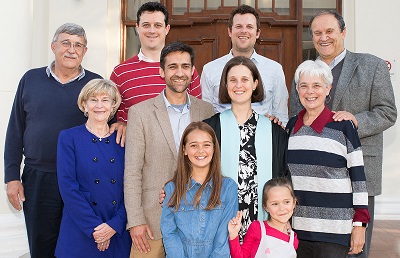Prof Ronelle Burger, a professor of Economics at Stellenbosch University, delivered her inaugural lecture with the title Amplifying the voices of our communities, on 20 August 2019.
Prof Burger's research examines why vulnerable communities receive such poor public services. Her work has been published in high-impact development and health journals such as Lancet Global Health, Economic Development and Cultural Change, and World Development.
In the last decade she and her research group have
been involved in a variety of projects in many different settings and fields,
but they have all been attempts to listen closely to people’s stories.
“As economic researchers, we use our analytical and econometric skills
to summarise these experiences in bar graphs and cross-tabulations and
regressions. Based on the analyses of these stories, we make recommendations to
policymakers about what should be done to make things better.”
Prof Burger referred to a study to assess the quality of clinical
services at public primary care facilities in the Cape Town and East London
metro by using the standardized or mystery patient approach – someone who pretends
to be an average patient, but who is in fact assessing the quality of the
services offered such as hypertension and TB screening, and contraception
advice.
When meeting the relevant health worker, standardized patients begin
with a specific opening sentence, e.g. “I have been coughing a lot recently” or
“I need advice on contraception”. This should predictably lead to a series of
further questions and tests as outlined by national guidelines and good
clinical practice. The methodology requires that one selects clinical cases
where specific symptoms map very clearly and simply to a set of questions and
procedures.
After the visit, the standardized patients capture the questions asked and
the tests conducted by the nurses on a score sheet.
“Our standardized patients were recruited from local communities and
they received extensive training to ensure that they know how to answer nurse
questions and also to not disclose any information without being asked for it," Prof Burger said.
“This is the first time that a standardized patient study has been
conducted in South Africa on this scale, so it was pioneering work, but
worthwhile. Across all three clinical domains, we found that service delivery
was lacking, that nurses were not complying with protocols and that clinics
were missing opportunities.”
She added that, through careful and incremental work, they have
started to understand just how large the divide is between doctors and their
patients, but also the extent to which information from patients may not always
be an accurate reflection of their experiences.
“Our work also suggests that technical language can impede research and
service delivery. In Malawi, our research showed large discrepancies in what
patients say happened in an antenatal care consultation and what was reported
by the independent medical specialist observing the consultation.
“The discrepancy is in both directions: patients saying that a procedure
did not happen when it did, according to the medical specialist – or patients
saying that the procedure did happen when it did not, according to the medical
specialist. The variation here appears to be most consistent with an
explanation that the patient failed to understand the questions they were asked.”
According to Prof Burger, perhaps the best place to start in trying to
close the gaps on both the supply and the demand side, is closest to home:
examining whether one’s own work is responsive to the daily battles of the
people of South Africa.
“It is vital that the stories that researchers
write and tell must try to also mirror the worries and concerns of the people
of South Africa. It needs to feed into their daily lives and connect with what
they care about,” she concluded.
Prof Burger serves on the editorial board of the Journal of Development Studies and is an associate editor of Development Southern Africa. She is also a research fellow at the Partnership for Economic Policy, and the Centre for Research in Economic Development and International Trade at Nottingham University. She has consulted to national and provincial government as well as multilateral donors such as UNICEF and the World Bank.
- For more information, click here.
- To watch a video of the inaugural lecture, click here.
- Photos by Anton Jordaan:
Main photo: F.l.t.r. are Professors Ingrid Woolard, Dean of the Faculty of Economic and Management Sciences; Ronelle Burger; and Wim de Villiers, Rector and Vice-Chancellor of Stellenbosch University.
Photo on the right: Prof Ronelle Burger and her family with her brothers (in the middle in the back row), parents (on the right) and parents in law (on the left).


